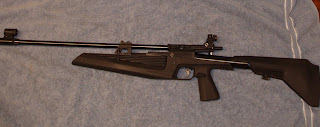Been shooting the IZH 61 for about 2 weeks now. I've been shooting it exclusively at 10-meter rifle targets and thinking about what I like and dislike about it's firing characteristics. It's pretty mellow as is, but I thought I'd see if I could make the shot cycle less twangy. And, just for fun, (and so you could see how badly I screw this up) and partly to get a baseline, I shot the rifle across the chronograph. Over 20 shots, the velocity ranged from a low of 498 to a high of 513 feet per second with RWS Hobby pellets. Good enough for paper punching.
Now all the bad news up front: It's always a safe bet that there will be velocity loss with a "lube tune". Anyone who tells you they just moly greased a bone-dry gun and got another 100+ fps should be treated with great suspicion and a wary eye. At this point, I wondered how much speed I'm willing to sacrifice to lose the spring vibration. Considered, too, that the Hobby is a lightweight pellet--so, it's already on the high end of the velocity range to begin with. Also looked at the spring through the cocking slot and noticed that it's at full compression when cocked--so there's really no room to shim the spring. Oh, man. This is gonna look bad if we just look at the velocity numbers later.

Here we go.

Removed the telescopic stock.

I removed the HW front sight (just unscrews from the barrel) and the Beeman Sport Aperture sight I'd installed here. Not necessary, I just didn't want to damage them inadvertently. Took out the 3 stock screws and set the stock safely aside.

Unscrewed both trigger/sear pins.

Took a good look at how the trigger and sear assembly fit together. Took a few pics at different angles in case I needed reference on reassembly. IZH manual refers to this as "sear 2". The trigger and "sear 2" are held by the rear pin. (IZH manual calls them "threaded pivots"--nice!)


The IZH manual calls this "sear 1". It's held by the front "threaded pivot".

Removed the circlip from the cocking lever pivot...

And pulled out the base of the cocking lever. I slid a pin punch into the pivot hole after I pulled the cocking lever out as a safety precaution.

Fished the "rocker"--the hinged part of the cocking lever that fits into the piston body--out at the front hole in the cocking slot.

Bracing the end cap against the work bench, I pulled the pin punch out and rotated the cap about 25 degrees. This removed a locking tab from a notch in the compression tube. Carefully let the spring ease out. The spring is only under about 30 lbs of preload. I didn't think a spring compressor was warranted. Do wear eye protection.

Piston and it's synthetic seal.

Used a diamond hone to remove any and all burrs.

Buffed the entire piston body.

More to come...
0 comments:
Post a Comment